NURS5002 - Health Literacy as a Key Social Determinant of Health
VerifiedAdded on 2023/06/13
|10
|2713
|312
Essay
AI Summary
This essay explores health literacy as a critical social determinant of health, influencing individuals' ability to access, understand, and utilize health information and services. It highlights the correlation between low health literacy and adverse health outcomes, including increased hospitalizations, poor chronic disease management, and higher healthcare costs. The essay emphasizes the need for public health initiatives and policies to improve health literacy, focusing on enhancing basic health competencies, navigating the healthcare system, and promoting informed decision-making. The discussion also covers the Australian context, revealing significant challenges in health literacy among the population and stressing the importance of addressing this issue to achieve better health outcomes and reduce healthcare disparities. Desklib offers a platform to explore similar solved assignments and study resources.
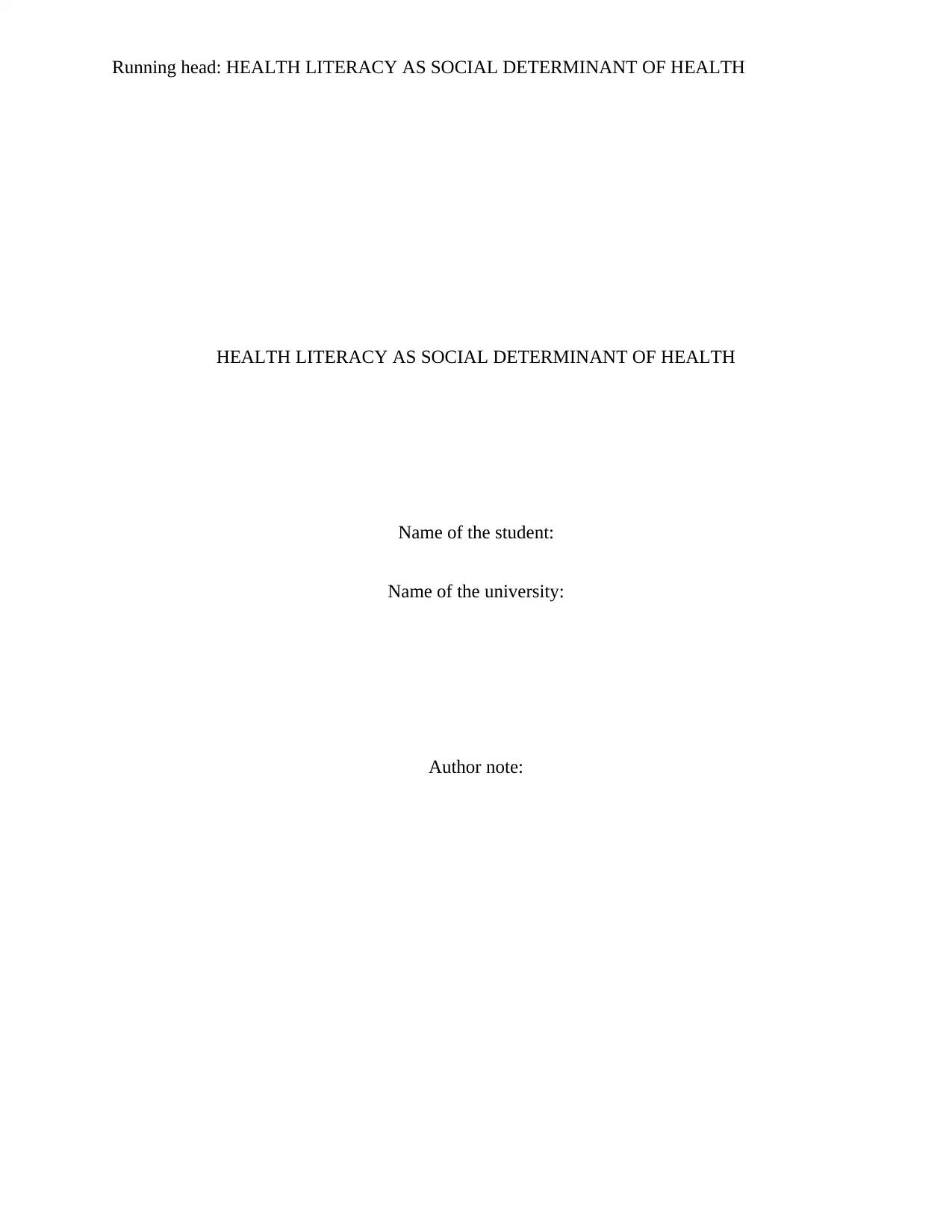
Running head: HEALTH LITERACY AS SOCIAL DETERMINANT OF HEALTH
HEALTH LITERACY AS SOCIAL DETERMINANT OF HEALTH
Name of the student:
Name of the university:
Author note:
HEALTH LITERACY AS SOCIAL DETERMINANT OF HEALTH
Name of the student:
Name of the university:
Author note:
Paraphrase This Document
Need a fresh take? Get an instant paraphrase of this document with our AI Paraphraser
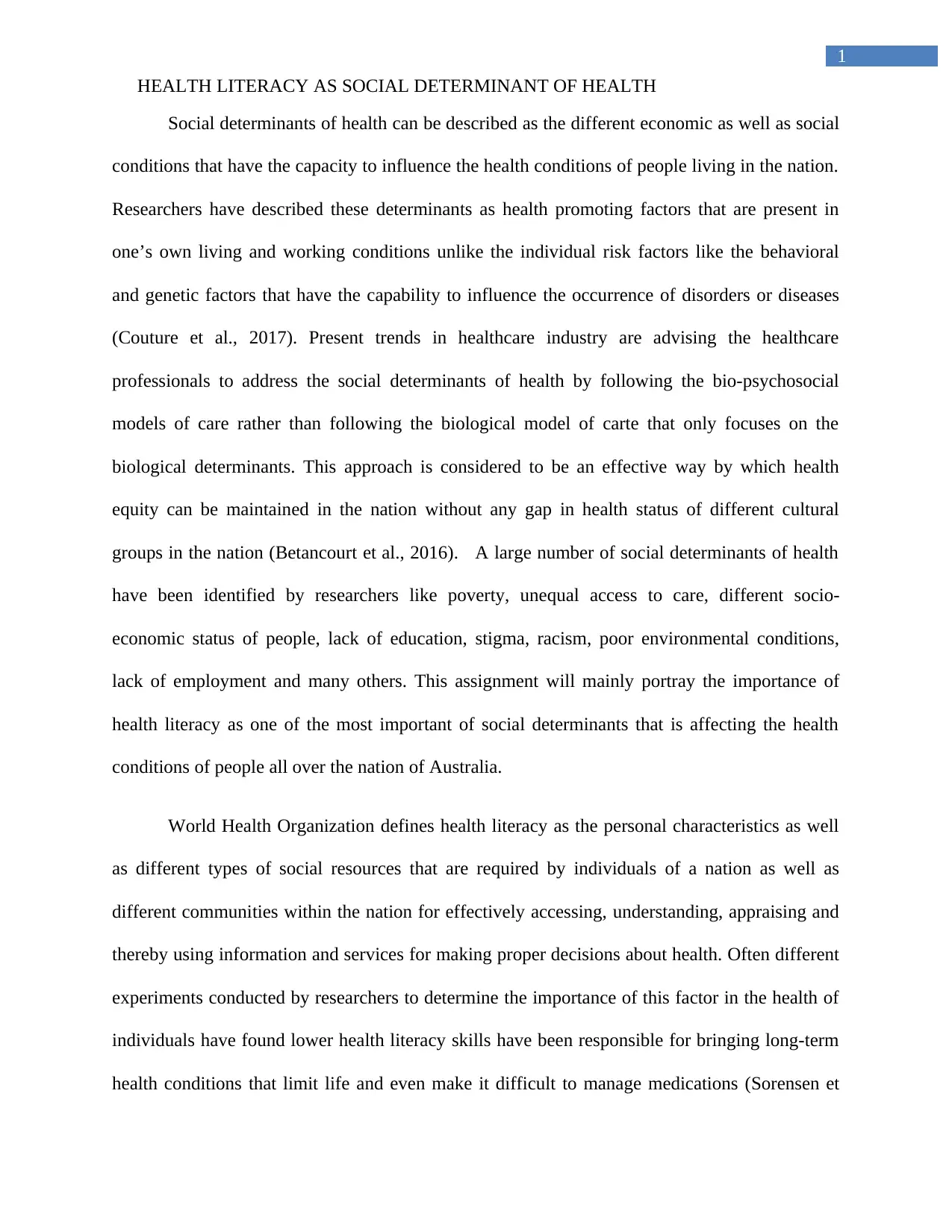
1
HEALTH LITERACY AS SOCIAL DETERMINANT OF HEALTH
Social determinants of health can be described as the different economic as well as social
conditions that have the capacity to influence the health conditions of people living in the nation.
Researchers have described these determinants as health promoting factors that are present in
one’s own living and working conditions unlike the individual risk factors like the behavioral
and genetic factors that have the capability to influence the occurrence of disorders or diseases
(Couture et al., 2017). Present trends in healthcare industry are advising the healthcare
professionals to address the social determinants of health by following the bio-psychosocial
models of care rather than following the biological model of carte that only focuses on the
biological determinants. This approach is considered to be an effective way by which health
equity can be maintained in the nation without any gap in health status of different cultural
groups in the nation (Betancourt et al., 2016). A large number of social determinants of health
have been identified by researchers like poverty, unequal access to care, different socio-
economic status of people, lack of education, stigma, racism, poor environmental conditions,
lack of employment and many others. This assignment will mainly portray the importance of
health literacy as one of the most important of social determinants that is affecting the health
conditions of people all over the nation of Australia.
World Health Organization defines health literacy as the personal characteristics as well
as different types of social resources that are required by individuals of a nation as well as
different communities within the nation for effectively accessing, understanding, appraising and
thereby using information and services for making proper decisions about health. Often different
experiments conducted by researchers to determine the importance of this factor in the health of
individuals have found lower health literacy skills have been responsible for bringing long-term
health conditions that limit life and even make it difficult to manage medications (Sorensen et
HEALTH LITERACY AS SOCIAL DETERMINANT OF HEALTH
Social determinants of health can be described as the different economic as well as social
conditions that have the capacity to influence the health conditions of people living in the nation.
Researchers have described these determinants as health promoting factors that are present in
one’s own living and working conditions unlike the individual risk factors like the behavioral
and genetic factors that have the capability to influence the occurrence of disorders or diseases
(Couture et al., 2017). Present trends in healthcare industry are advising the healthcare
professionals to address the social determinants of health by following the bio-psychosocial
models of care rather than following the biological model of carte that only focuses on the
biological determinants. This approach is considered to be an effective way by which health
equity can be maintained in the nation without any gap in health status of different cultural
groups in the nation (Betancourt et al., 2016). A large number of social determinants of health
have been identified by researchers like poverty, unequal access to care, different socio-
economic status of people, lack of education, stigma, racism, poor environmental conditions,
lack of employment and many others. This assignment will mainly portray the importance of
health literacy as one of the most important of social determinants that is affecting the health
conditions of people all over the nation of Australia.
World Health Organization defines health literacy as the personal characteristics as well
as different types of social resources that are required by individuals of a nation as well as
different communities within the nation for effectively accessing, understanding, appraising and
thereby using information and services for making proper decisions about health. Often different
experiments conducted by researchers to determine the importance of this factor in the health of
individuals have found lower health literacy skills have been responsible for bringing long-term
health conditions that limit life and even make it difficult to manage medications (Sorensen et
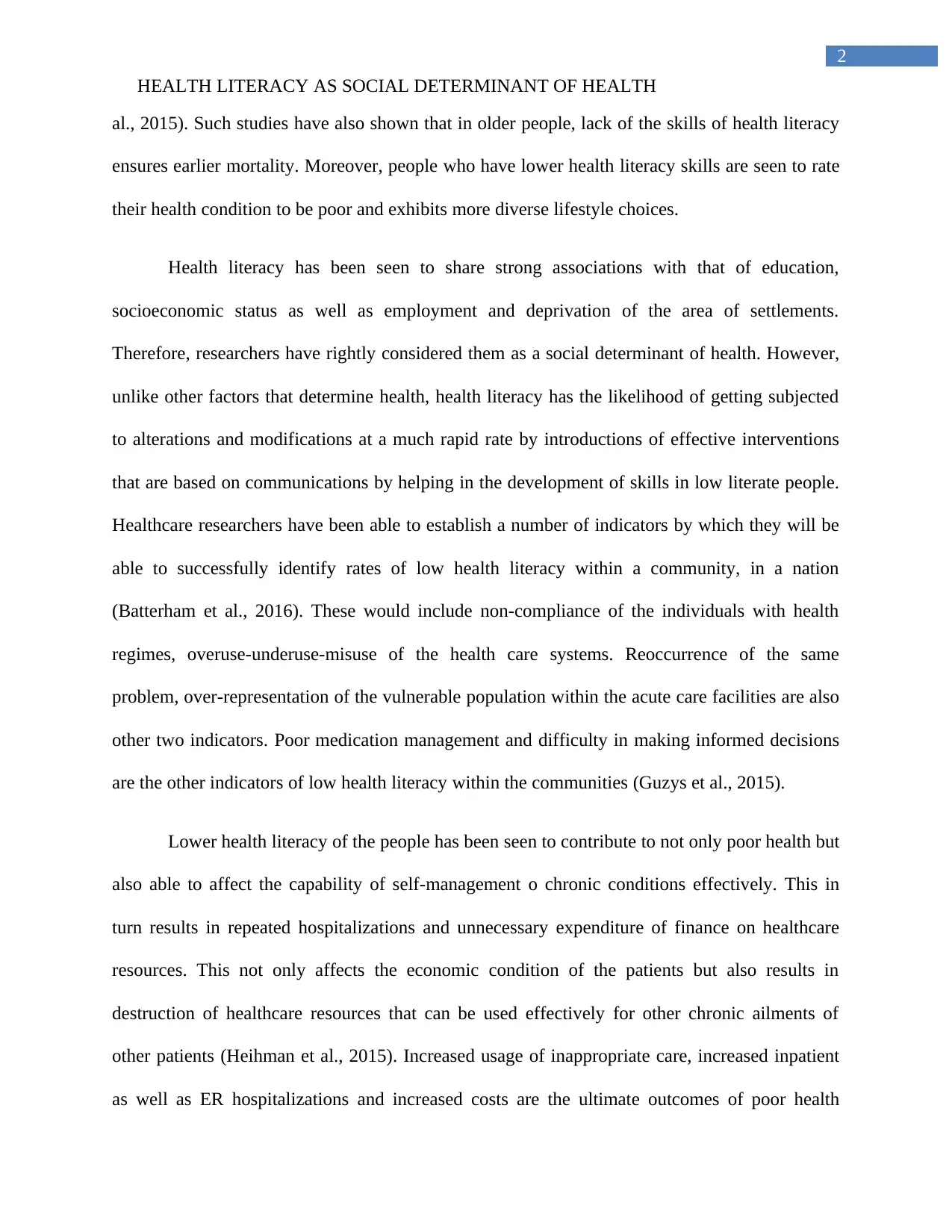
2
HEALTH LITERACY AS SOCIAL DETERMINANT OF HEALTH
al., 2015). Such studies have also shown that in older people, lack of the skills of health literacy
ensures earlier mortality. Moreover, people who have lower health literacy skills are seen to rate
their health condition to be poor and exhibits more diverse lifestyle choices.
Health literacy has been seen to share strong associations with that of education,
socioeconomic status as well as employment and deprivation of the area of settlements.
Therefore, researchers have rightly considered them as a social determinant of health. However,
unlike other factors that determine health, health literacy has the likelihood of getting subjected
to alterations and modifications at a much rapid rate by introductions of effective interventions
that are based on communications by helping in the development of skills in low literate people.
Healthcare researchers have been able to establish a number of indicators by which they will be
able to successfully identify rates of low health literacy within a community, in a nation
(Batterham et al., 2016). These would include non-compliance of the individuals with health
regimes, overuse-underuse-misuse of the health care systems. Reoccurrence of the same
problem, over-representation of the vulnerable population within the acute care facilities are also
other two indicators. Poor medication management and difficulty in making informed decisions
are the other indicators of low health literacy within the communities (Guzys et al., 2015).
Lower health literacy of the people has been seen to contribute to not only poor health but
also able to affect the capability of self-management o chronic conditions effectively. This in
turn results in repeated hospitalizations and unnecessary expenditure of finance on healthcare
resources. This not only affects the economic condition of the patients but also results in
destruction of healthcare resources that can be used effectively for other chronic ailments of
other patients (Heihman et al., 2015). Increased usage of inappropriate care, increased inpatient
as well as ER hospitalizations and increased costs are the ultimate outcomes of poor health
HEALTH LITERACY AS SOCIAL DETERMINANT OF HEALTH
al., 2015). Such studies have also shown that in older people, lack of the skills of health literacy
ensures earlier mortality. Moreover, people who have lower health literacy skills are seen to rate
their health condition to be poor and exhibits more diverse lifestyle choices.
Health literacy has been seen to share strong associations with that of education,
socioeconomic status as well as employment and deprivation of the area of settlements.
Therefore, researchers have rightly considered them as a social determinant of health. However,
unlike other factors that determine health, health literacy has the likelihood of getting subjected
to alterations and modifications at a much rapid rate by introductions of effective interventions
that are based on communications by helping in the development of skills in low literate people.
Healthcare researchers have been able to establish a number of indicators by which they will be
able to successfully identify rates of low health literacy within a community, in a nation
(Batterham et al., 2016). These would include non-compliance of the individuals with health
regimes, overuse-underuse-misuse of the health care systems. Reoccurrence of the same
problem, over-representation of the vulnerable population within the acute care facilities are also
other two indicators. Poor medication management and difficulty in making informed decisions
are the other indicators of low health literacy within the communities (Guzys et al., 2015).
Lower health literacy of the people has been seen to contribute to not only poor health but
also able to affect the capability of self-management o chronic conditions effectively. This in
turn results in repeated hospitalizations and unnecessary expenditure of finance on healthcare
resources. This not only affects the economic condition of the patients but also results in
destruction of healthcare resources that can be used effectively for other chronic ailments of
other patients (Heihman et al., 2015). Increased usage of inappropriate care, increased inpatient
as well as ER hospitalizations and increased costs are the ultimate outcomes of poor health
⊘ This is a preview!⊘
Do you want full access?
Subscribe today to unlock all pages.

Trusted by 1+ million students worldwide
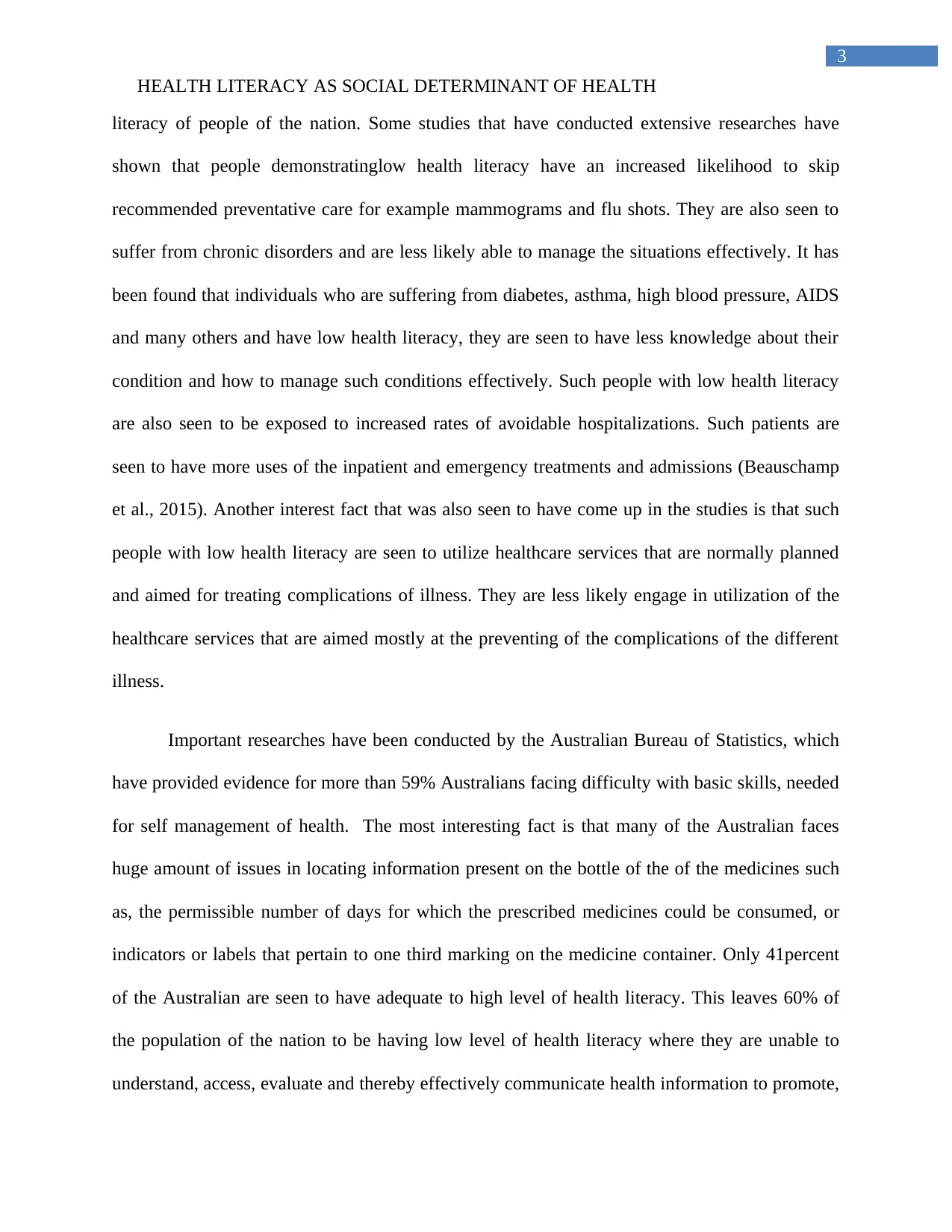
3
HEALTH LITERACY AS SOCIAL DETERMINANT OF HEALTH
literacy of people of the nation. Some studies that have conducted extensive researches have
shown that people demonstratinglow health literacy have an increased likelihood to skip
recommended preventative care for example mammograms and flu shots. They are also seen to
suffer from chronic disorders and are less likely able to manage the situations effectively. It has
been found that individuals who are suffering from diabetes, asthma, high blood pressure, AIDS
and many others and have low health literacy, they are seen to have less knowledge about their
condition and how to manage such conditions effectively. Such people with low health literacy
are also seen to be exposed to increased rates of avoidable hospitalizations. Such patients are
seen to have more uses of the inpatient and emergency treatments and admissions (Beauschamp
et al., 2015). Another interest fact that was also seen to have come up in the studies is that such
people with low health literacy are seen to utilize healthcare services that are normally planned
and aimed for treating complications of illness. They are less likely engage in utilization of the
healthcare services that are aimed mostly at the preventing of the complications of the different
illness.
Important researches have been conducted by the Australian Bureau of Statistics, which
have provided evidence for more than 59% Australians facing difficulty with basic skills, needed
for self management of health. The most interesting fact is that many of the Australian faces
huge amount of issues in locating information present on the bottle of the of the medicines such
as, the permissible number of days for which the prescribed medicines could be consumed, or
indicators or labels that pertain to one third marking on the medicine container. Only 41percent
of the Australian are seen to have adequate to high level of health literacy. This leaves 60% of
the population of the nation to be having low level of health literacy where they are unable to
understand, access, evaluate and thereby effectively communicate health information to promote,
HEALTH LITERACY AS SOCIAL DETERMINANT OF HEALTH
literacy of people of the nation. Some studies that have conducted extensive researches have
shown that people demonstratinglow health literacy have an increased likelihood to skip
recommended preventative care for example mammograms and flu shots. They are also seen to
suffer from chronic disorders and are less likely able to manage the situations effectively. It has
been found that individuals who are suffering from diabetes, asthma, high blood pressure, AIDS
and many others and have low health literacy, they are seen to have less knowledge about their
condition and how to manage such conditions effectively. Such people with low health literacy
are also seen to be exposed to increased rates of avoidable hospitalizations. Such patients are
seen to have more uses of the inpatient and emergency treatments and admissions (Beauschamp
et al., 2015). Another interest fact that was also seen to have come up in the studies is that such
people with low health literacy are seen to utilize healthcare services that are normally planned
and aimed for treating complications of illness. They are less likely engage in utilization of the
healthcare services that are aimed mostly at the preventing of the complications of the different
illness.
Important researches have been conducted by the Australian Bureau of Statistics, which
have provided evidence for more than 59% Australians facing difficulty with basic skills, needed
for self management of health. The most interesting fact is that many of the Australian faces
huge amount of issues in locating information present on the bottle of the of the medicines such
as, the permissible number of days for which the prescribed medicines could be consumed, or
indicators or labels that pertain to one third marking on the medicine container. Only 41percent
of the Australian are seen to have adequate to high level of health literacy. This leaves 60% of
the population of the nation to be having low level of health literacy where they are unable to
understand, access, evaluate and thereby effectively communicate health information to promote,
Paraphrase This Document
Need a fresh take? Get an instant paraphrase of this document with our AI Paraphraser
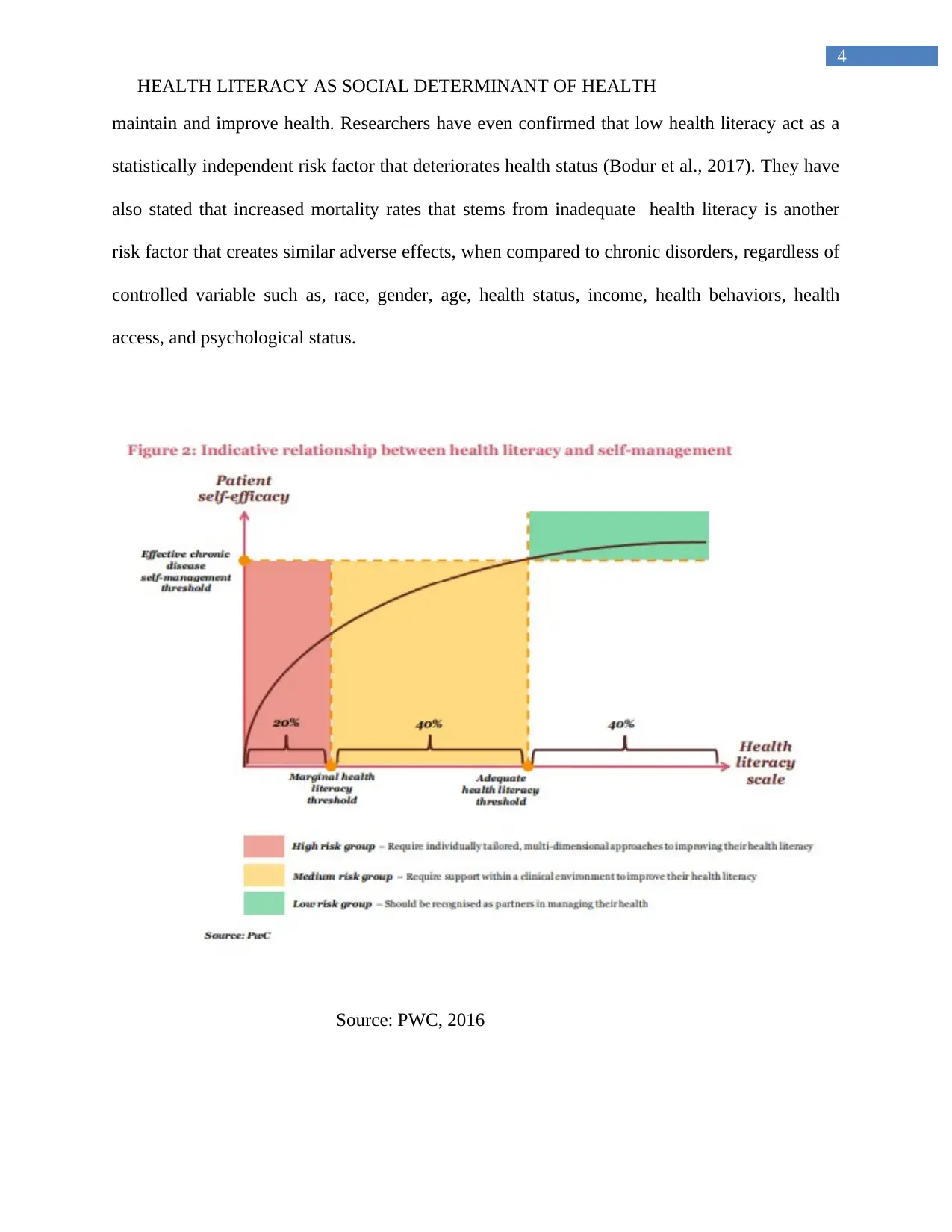
4
HEALTH LITERACY AS SOCIAL DETERMINANT OF HEALTH
maintain and improve health. Researchers have even confirmed that low health literacy act as a
statistically independent risk factor that deteriorates health status (Bodur et al., 2017). They have
also stated that increased mortality rates that stems from inadequate health literacy is another
risk factor that creates similar adverse effects, when compared to chronic disorders, regardless of
controlled variable such as, race, gender, age, health status, income, health behaviors, health
access, and psychological status.
Source: PWC, 2016
HEALTH LITERACY AS SOCIAL DETERMINANT OF HEALTH
maintain and improve health. Researchers have even confirmed that low health literacy act as a
statistically independent risk factor that deteriorates health status (Bodur et al., 2017). They have
also stated that increased mortality rates that stems from inadequate health literacy is another
risk factor that creates similar adverse effects, when compared to chronic disorders, regardless of
controlled variable such as, race, gender, age, health status, income, health behaviors, health
access, and psychological status.
Source: PWC, 2016
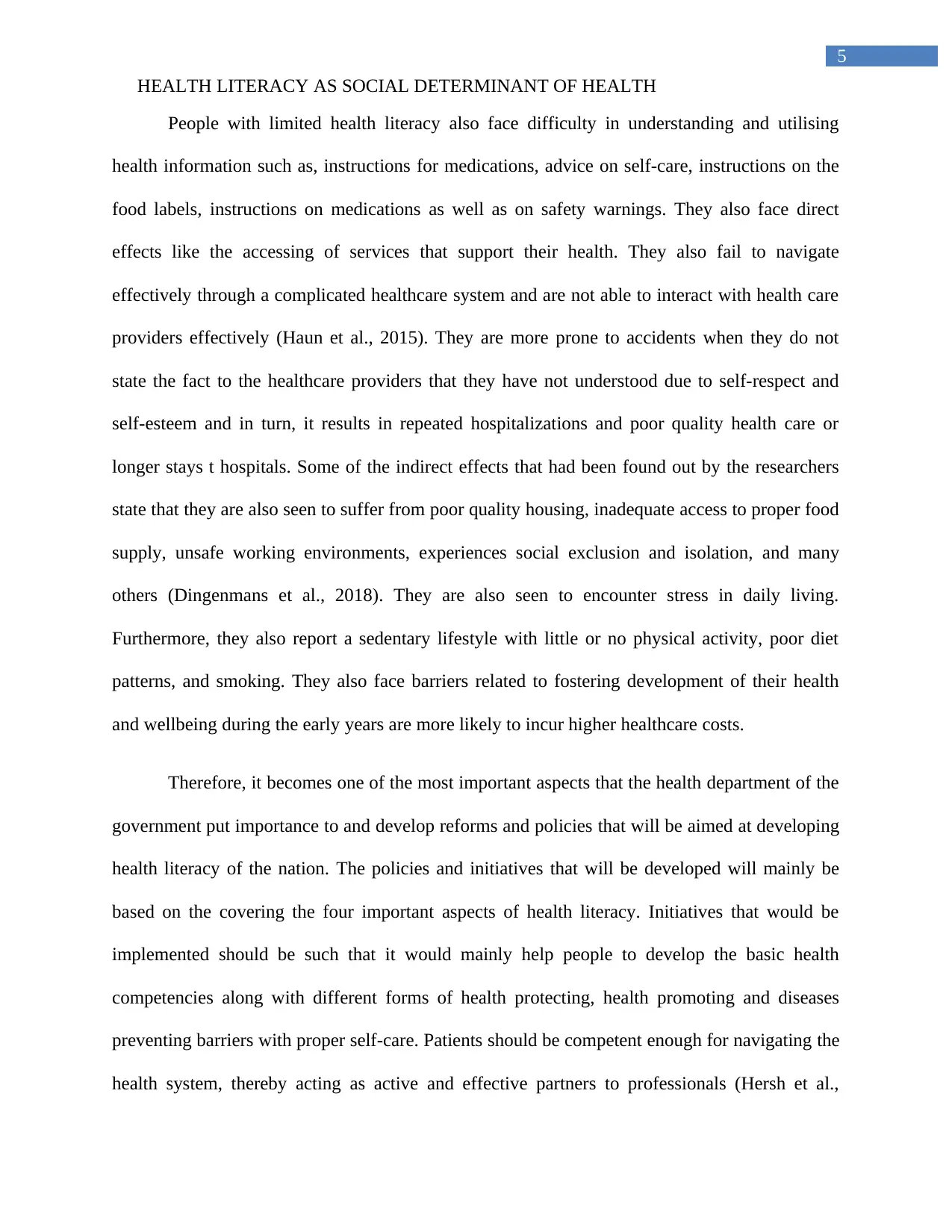
5
HEALTH LITERACY AS SOCIAL DETERMINANT OF HEALTH
People with limited health literacy also face difficulty in understanding and utilising
health information such as, instructions for medications, advice on self-care, instructions on the
food labels, instructions on medications as well as on safety warnings. They also face direct
effects like the accessing of services that support their health. They also fail to navigate
effectively through a complicated healthcare system and are not able to interact with health care
providers effectively (Haun et al., 2015). They are more prone to accidents when they do not
state the fact to the healthcare providers that they have not understood due to self-respect and
self-esteem and in turn, it results in repeated hospitalizations and poor quality health care or
longer stays t hospitals. Some of the indirect effects that had been found out by the researchers
state that they are also seen to suffer from poor quality housing, inadequate access to proper food
supply, unsafe working environments, experiences social exclusion and isolation, and many
others (Dingenmans et al., 2018). They are also seen to encounter stress in daily living.
Furthermore, they also report a sedentary lifestyle with little or no physical activity, poor diet
patterns, and smoking. They also face barriers related to fostering development of their health
and wellbeing during the early years are more likely to incur higher healthcare costs.
Therefore, it becomes one of the most important aspects that the health department of the
government put importance to and develop reforms and policies that will be aimed at developing
health literacy of the nation. The policies and initiatives that will be developed will mainly be
based on the covering the four important aspects of health literacy. Initiatives that would be
implemented should be such that it would mainly help people to develop the basic health
competencies along with different forms of health protecting, health promoting and diseases
preventing barriers with proper self-care. Patients should be competent enough for navigating the
health system, thereby acting as active and effective partners to professionals (Hersh et al.,
HEALTH LITERACY AS SOCIAL DETERMINANT OF HEALTH
People with limited health literacy also face difficulty in understanding and utilising
health information such as, instructions for medications, advice on self-care, instructions on the
food labels, instructions on medications as well as on safety warnings. They also face direct
effects like the accessing of services that support their health. They also fail to navigate
effectively through a complicated healthcare system and are not able to interact with health care
providers effectively (Haun et al., 2015). They are more prone to accidents when they do not
state the fact to the healthcare providers that they have not understood due to self-respect and
self-esteem and in turn, it results in repeated hospitalizations and poor quality health care or
longer stays t hospitals. Some of the indirect effects that had been found out by the researchers
state that they are also seen to suffer from poor quality housing, inadequate access to proper food
supply, unsafe working environments, experiences social exclusion and isolation, and many
others (Dingenmans et al., 2018). They are also seen to encounter stress in daily living.
Furthermore, they also report a sedentary lifestyle with little or no physical activity, poor diet
patterns, and smoking. They also face barriers related to fostering development of their health
and wellbeing during the early years are more likely to incur higher healthcare costs.
Therefore, it becomes one of the most important aspects that the health department of the
government put importance to and develop reforms and policies that will be aimed at developing
health literacy of the nation. The policies and initiatives that will be developed will mainly be
based on the covering the four important aspects of health literacy. Initiatives that would be
implemented should be such that it would mainly help people to develop the basic health
competencies along with different forms of health protecting, health promoting and diseases
preventing barriers with proper self-care. Patients should be competent enough for navigating the
health system, thereby acting as active and effective partners to professionals (Hersh et al.,
⊘ This is a preview!⊘
Do you want full access?
Subscribe today to unlock all pages.

Trusted by 1+ million students worldwide
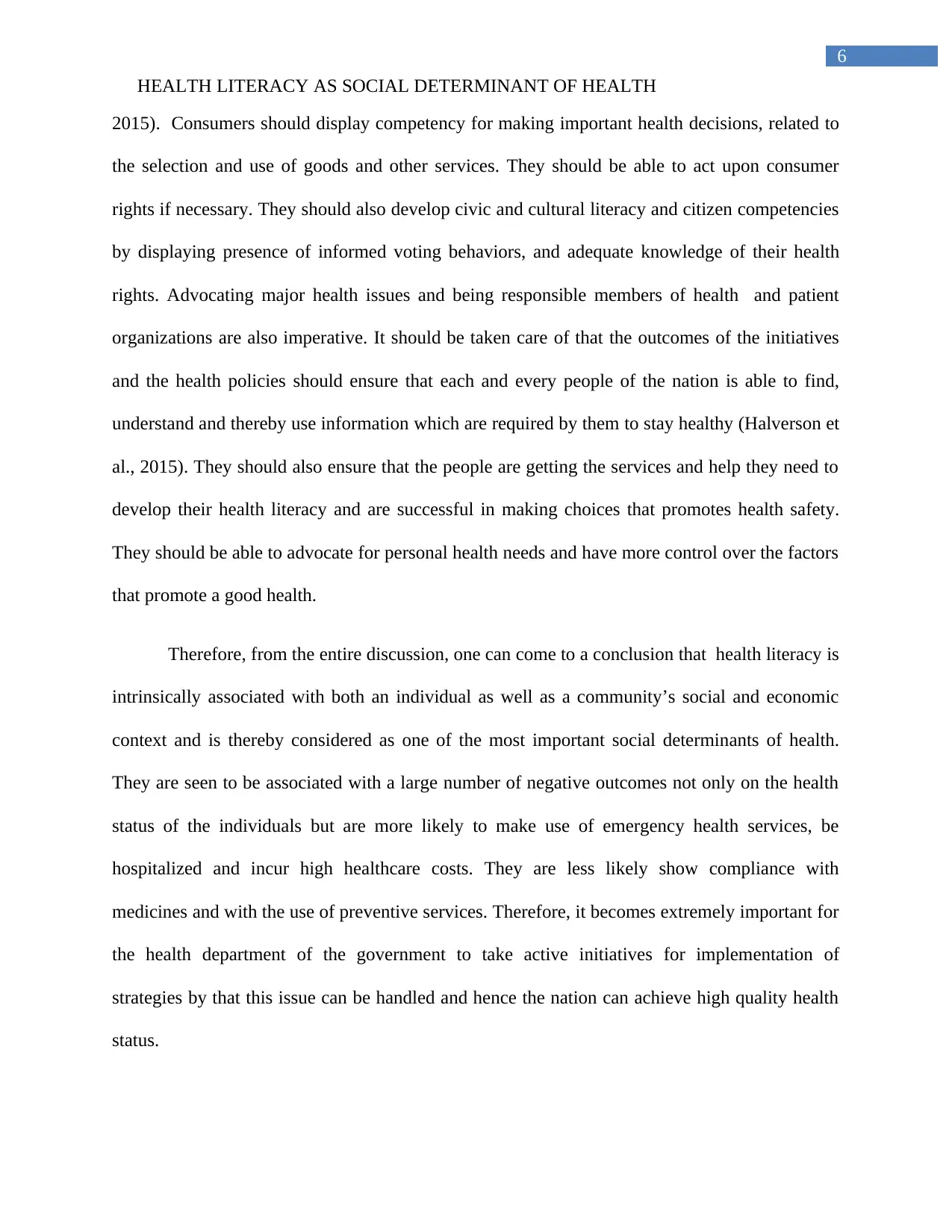
6
HEALTH LITERACY AS SOCIAL DETERMINANT OF HEALTH
2015). Consumers should display competency for making important health decisions, related to
the selection and use of goods and other services. They should be able to act upon consumer
rights if necessary. They should also develop civic and cultural literacy and citizen competencies
by displaying presence of informed voting behaviors, and adequate knowledge of their health
rights. Advocating major health issues and being responsible members of health and patient
organizations are also imperative. It should be taken care of that the outcomes of the initiatives
and the health policies should ensure that each and every people of the nation is able to find,
understand and thereby use information which are required by them to stay healthy (Halverson et
al., 2015). They should also ensure that the people are getting the services and help they need to
develop their health literacy and are successful in making choices that promotes health safety.
They should be able to advocate for personal health needs and have more control over the factors
that promote a good health.
Therefore, from the entire discussion, one can come to a conclusion that health literacy is
intrinsically associated with both an individual as well as a community’s social and economic
context and is thereby considered as one of the most important social determinants of health.
They are seen to be associated with a large number of negative outcomes not only on the health
status of the individuals but are more likely to make use of emergency health services, be
hospitalized and incur high healthcare costs. They are less likely show compliance with
medicines and with the use of preventive services. Therefore, it becomes extremely important for
the health department of the government to take active initiatives for implementation of
strategies by that this issue can be handled and hence the nation can achieve high quality health
status.
HEALTH LITERACY AS SOCIAL DETERMINANT OF HEALTH
2015). Consumers should display competency for making important health decisions, related to
the selection and use of goods and other services. They should be able to act upon consumer
rights if necessary. They should also develop civic and cultural literacy and citizen competencies
by displaying presence of informed voting behaviors, and adequate knowledge of their health
rights. Advocating major health issues and being responsible members of health and patient
organizations are also imperative. It should be taken care of that the outcomes of the initiatives
and the health policies should ensure that each and every people of the nation is able to find,
understand and thereby use information which are required by them to stay healthy (Halverson et
al., 2015). They should also ensure that the people are getting the services and help they need to
develop their health literacy and are successful in making choices that promotes health safety.
They should be able to advocate for personal health needs and have more control over the factors
that promote a good health.
Therefore, from the entire discussion, one can come to a conclusion that health literacy is
intrinsically associated with both an individual as well as a community’s social and economic
context and is thereby considered as one of the most important social determinants of health.
They are seen to be associated with a large number of negative outcomes not only on the health
status of the individuals but are more likely to make use of emergency health services, be
hospitalized and incur high healthcare costs. They are less likely show compliance with
medicines and with the use of preventive services. Therefore, it becomes extremely important for
the health department of the government to take active initiatives for implementation of
strategies by that this issue can be handled and hence the nation can achieve high quality health
status.
Paraphrase This Document
Need a fresh take? Get an instant paraphrase of this document with our AI Paraphraser
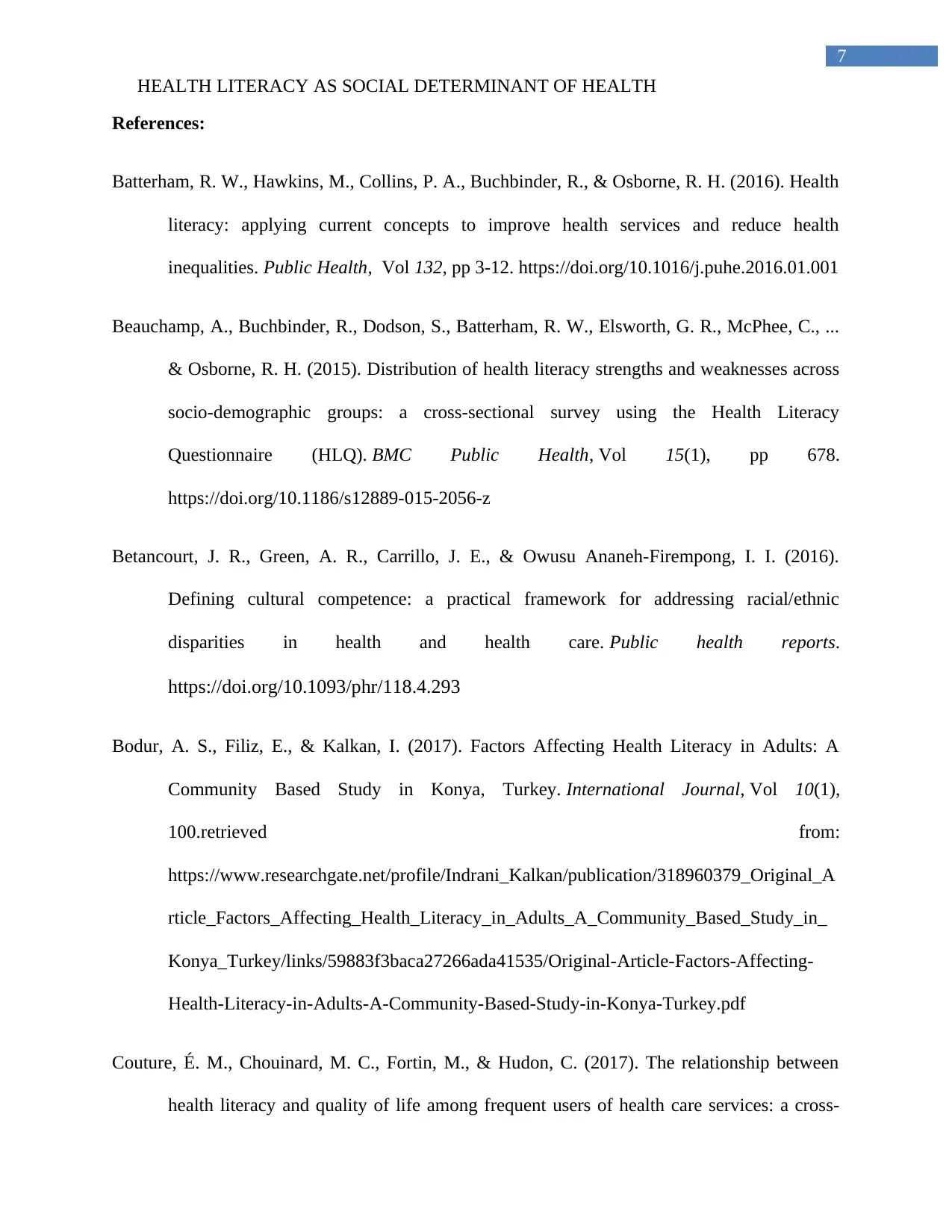
7
HEALTH LITERACY AS SOCIAL DETERMINANT OF HEALTH
References:
Batterham, R. W., Hawkins, M., Collins, P. A., Buchbinder, R., & Osborne, R. H. (2016). Health
literacy: applying current concepts to improve health services and reduce health
inequalities. Public Health, Vol 132, pp 3-12. https://doi.org/10.1016/j.puhe.2016.01.001
Beauchamp, A., Buchbinder, R., Dodson, S., Batterham, R. W., Elsworth, G. R., McPhee, C., ...
& Osborne, R. H. (2015). Distribution of health literacy strengths and weaknesses across
socio-demographic groups: a cross-sectional survey using the Health Literacy
Questionnaire (HLQ). BMC Public Health, Vol 15(1), pp 678.
https://doi.org/10.1186/s12889-015-2056-z
Betancourt, J. R., Green, A. R., Carrillo, J. E., & Owusu Ananeh-Firempong, I. I. (2016).
Defining cultural competence: a practical framework for addressing racial/ethnic
disparities in health and health care. Public health reports.
https://doi.org/10.1093/phr/118.4.293
Bodur, A. S., Filiz, E., & Kalkan, I. (2017). Factors Affecting Health Literacy in Adults: A
Community Based Study in Konya, Turkey. International Journal, Vol 10(1),
100.retrieved from:
https://www.researchgate.net/profile/Indrani_Kalkan/publication/318960379_Original_A
rticle_Factors_Affecting_Health_Literacy_in_Adults_A_Community_Based_Study_in_
Konya_Turkey/links/59883f3baca27266ada41535/Original-Article-Factors-Affecting-
Health-Literacy-in-Adults-A-Community-Based-Study-in-Konya-Turkey.pdf
Couture, É. M., Chouinard, M. C., Fortin, M., & Hudon, C. (2017). The relationship between
health literacy and quality of life among frequent users of health care services: a cross-
HEALTH LITERACY AS SOCIAL DETERMINANT OF HEALTH
References:
Batterham, R. W., Hawkins, M., Collins, P. A., Buchbinder, R., & Osborne, R. H. (2016). Health
literacy: applying current concepts to improve health services and reduce health
inequalities. Public Health, Vol 132, pp 3-12. https://doi.org/10.1016/j.puhe.2016.01.001
Beauchamp, A., Buchbinder, R., Dodson, S., Batterham, R. W., Elsworth, G. R., McPhee, C., ...
& Osborne, R. H. (2015). Distribution of health literacy strengths and weaknesses across
socio-demographic groups: a cross-sectional survey using the Health Literacy
Questionnaire (HLQ). BMC Public Health, Vol 15(1), pp 678.
https://doi.org/10.1186/s12889-015-2056-z
Betancourt, J. R., Green, A. R., Carrillo, J. E., & Owusu Ananeh-Firempong, I. I. (2016).
Defining cultural competence: a practical framework for addressing racial/ethnic
disparities in health and health care. Public health reports.
https://doi.org/10.1093/phr/118.4.293
Bodur, A. S., Filiz, E., & Kalkan, I. (2017). Factors Affecting Health Literacy in Adults: A
Community Based Study in Konya, Turkey. International Journal, Vol 10(1),
100.retrieved from:
https://www.researchgate.net/profile/Indrani_Kalkan/publication/318960379_Original_A
rticle_Factors_Affecting_Health_Literacy_in_Adults_A_Community_Based_Study_in_
Konya_Turkey/links/59883f3baca27266ada41535/Original-Article-Factors-Affecting-
Health-Literacy-in-Adults-A-Community-Based-Study-in-Konya-Turkey.pdf
Couture, É. M., Chouinard, M. C., Fortin, M., & Hudon, C. (2017). The relationship between
health literacy and quality of life among frequent users of health care services: a cross-
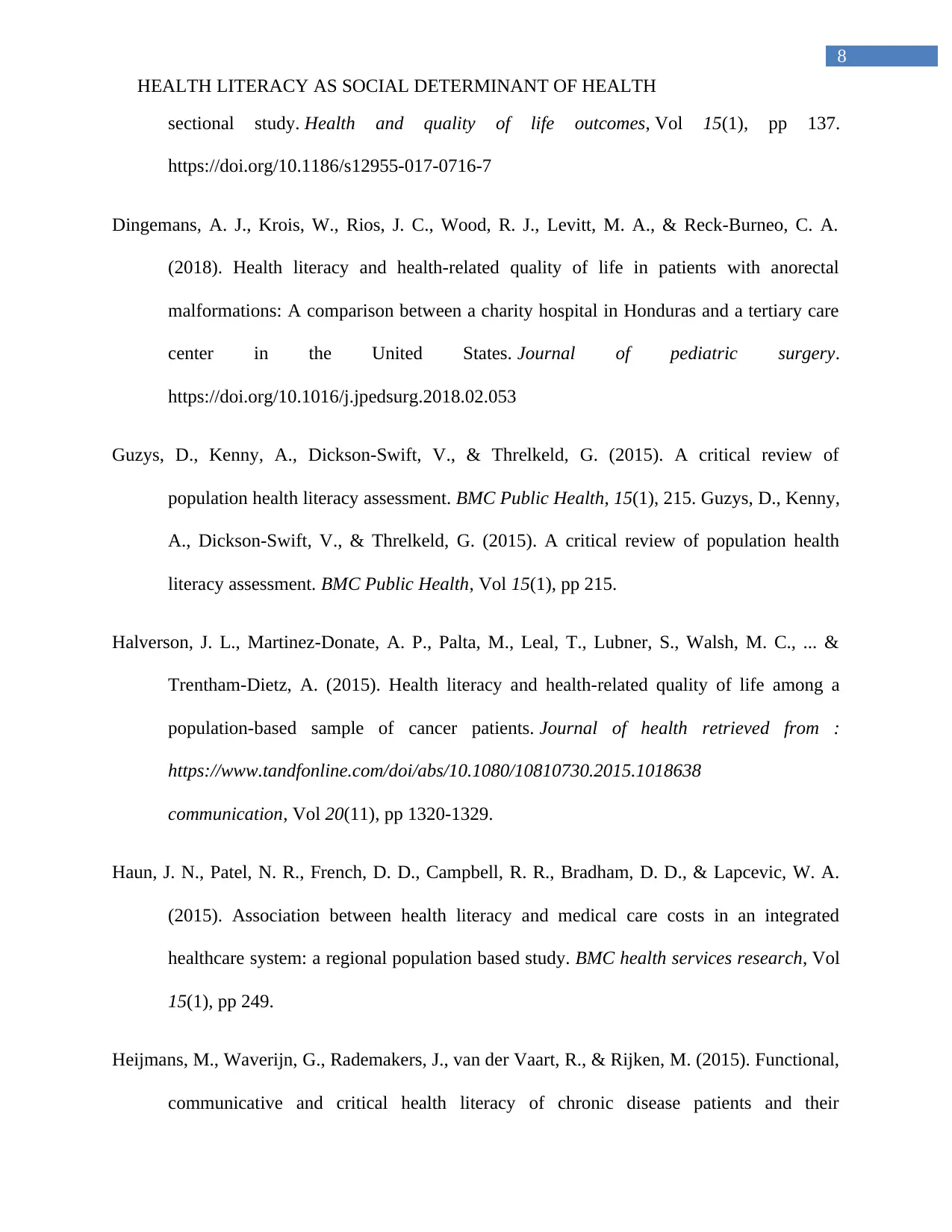
8
HEALTH LITERACY AS SOCIAL DETERMINANT OF HEALTH
sectional study. Health and quality of life outcomes, Vol 15(1), pp 137.
https://doi.org/10.1186/s12955-017-0716-7
Dingemans, A. J., Krois, W., Rios, J. C., Wood, R. J., Levitt, M. A., & Reck-Burneo, C. A.
(2018). Health literacy and health-related quality of life in patients with anorectal
malformations: A comparison between a charity hospital in Honduras and a tertiary care
center in the United States. Journal of pediatric surgery.
https://doi.org/10.1016/j.jpedsurg.2018.02.053
Guzys, D., Kenny, A., Dickson-Swift, V., & Threlkeld, G. (2015). A critical review of
population health literacy assessment. BMC Public Health, 15(1), 215. Guzys, D., Kenny,
A., Dickson-Swift, V., & Threlkeld, G. (2015). A critical review of population health
literacy assessment. BMC Public Health, Vol 15(1), pp 215.
Halverson, J. L., Martinez-Donate, A. P., Palta, M., Leal, T., Lubner, S., Walsh, M. C., ... &
Trentham-Dietz, A. (2015). Health literacy and health-related quality of life among a
population-based sample of cancer patients. Journal of health retrieved from :
https://www.tandfonline.com/doi/abs/10.1080/10810730.2015.1018638
communication, Vol 20(11), pp 1320-1329.
Haun, J. N., Patel, N. R., French, D. D., Campbell, R. R., Bradham, D. D., & Lapcevic, W. A.
(2015). Association between health literacy and medical care costs in an integrated
healthcare system: a regional population based study. BMC health services research, Vol
15(1), pp 249.
Heijmans, M., Waverijn, G., Rademakers, J., van der Vaart, R., & Rijken, M. (2015). Functional,
communicative and critical health literacy of chronic disease patients and their
HEALTH LITERACY AS SOCIAL DETERMINANT OF HEALTH
sectional study. Health and quality of life outcomes, Vol 15(1), pp 137.
https://doi.org/10.1186/s12955-017-0716-7
Dingemans, A. J., Krois, W., Rios, J. C., Wood, R. J., Levitt, M. A., & Reck-Burneo, C. A.
(2018). Health literacy and health-related quality of life in patients with anorectal
malformations: A comparison between a charity hospital in Honduras and a tertiary care
center in the United States. Journal of pediatric surgery.
https://doi.org/10.1016/j.jpedsurg.2018.02.053
Guzys, D., Kenny, A., Dickson-Swift, V., & Threlkeld, G. (2015). A critical review of
population health literacy assessment. BMC Public Health, 15(1), 215. Guzys, D., Kenny,
A., Dickson-Swift, V., & Threlkeld, G. (2015). A critical review of population health
literacy assessment. BMC Public Health, Vol 15(1), pp 215.
Halverson, J. L., Martinez-Donate, A. P., Palta, M., Leal, T., Lubner, S., Walsh, M. C., ... &
Trentham-Dietz, A. (2015). Health literacy and health-related quality of life among a
population-based sample of cancer patients. Journal of health retrieved from :
https://www.tandfonline.com/doi/abs/10.1080/10810730.2015.1018638
communication, Vol 20(11), pp 1320-1329.
Haun, J. N., Patel, N. R., French, D. D., Campbell, R. R., Bradham, D. D., & Lapcevic, W. A.
(2015). Association between health literacy and medical care costs in an integrated
healthcare system: a regional population based study. BMC health services research, Vol
15(1), pp 249.
Heijmans, M., Waverijn, G., Rademakers, J., van der Vaart, R., & Rijken, M. (2015). Functional,
communicative and critical health literacy of chronic disease patients and their
⊘ This is a preview!⊘
Do you want full access?
Subscribe today to unlock all pages.

Trusted by 1+ million students worldwide
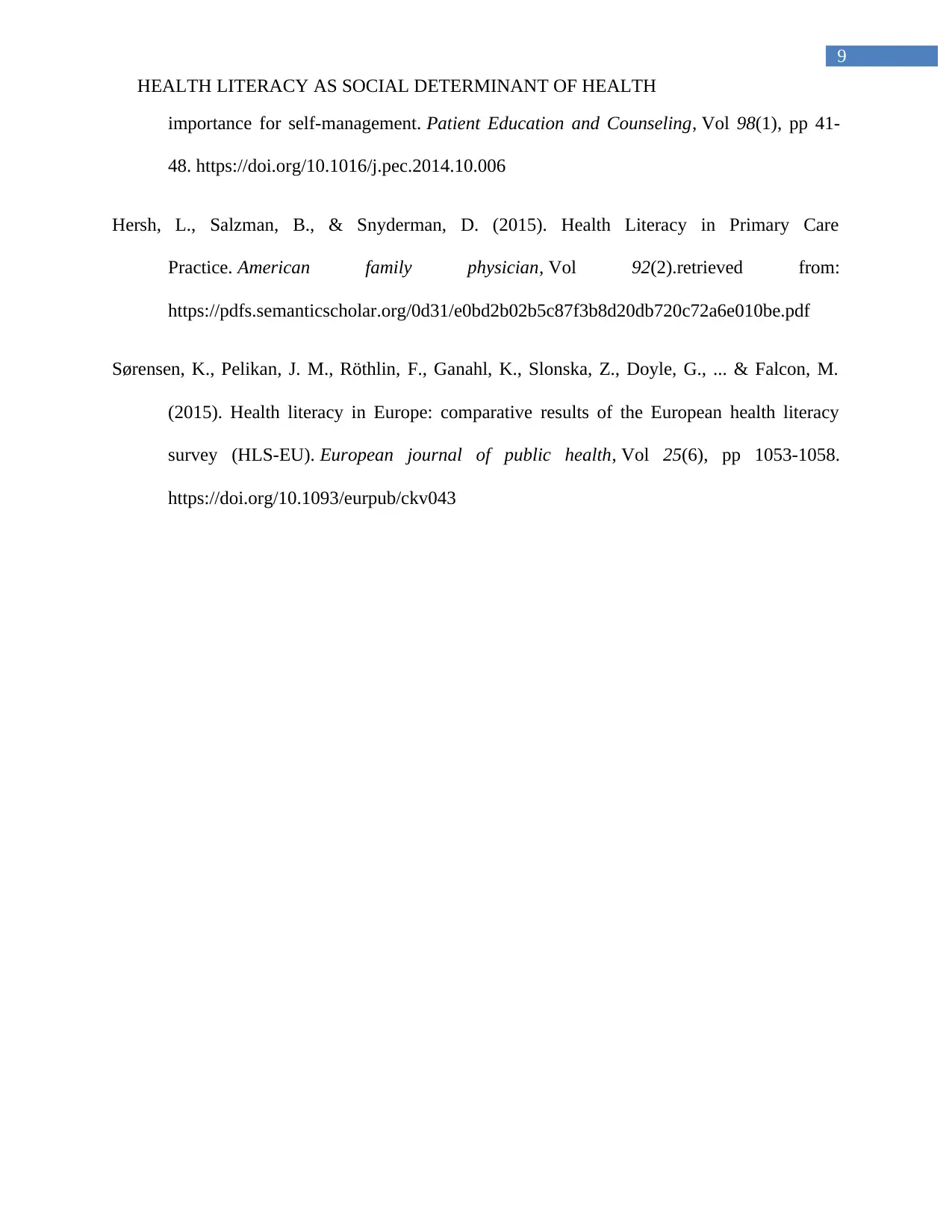
9
HEALTH LITERACY AS SOCIAL DETERMINANT OF HEALTH
importance for self-management. Patient Education and Counseling, Vol 98(1), pp 41-
48. https://doi.org/10.1016/j.pec.2014.10.006
Hersh, L., Salzman, B., & Snyderman, D. (2015). Health Literacy in Primary Care
Practice. American family physician, Vol 92(2).retrieved from:
https://pdfs.semanticscholar.org/0d31/e0bd2b02b5c87f3b8d20db720c72a6e010be.pdf
Sørensen, K., Pelikan, J. M., Röthlin, F., Ganahl, K., Slonska, Z., Doyle, G., ... & Falcon, M.
(2015). Health literacy in Europe: comparative results of the European health literacy
survey (HLS-EU). European journal of public health, Vol 25(6), pp 1053-1058.
https://doi.org/10.1093/eurpub/ckv043
HEALTH LITERACY AS SOCIAL DETERMINANT OF HEALTH
importance for self-management. Patient Education and Counseling, Vol 98(1), pp 41-
48. https://doi.org/10.1016/j.pec.2014.10.006
Hersh, L., Salzman, B., & Snyderman, D. (2015). Health Literacy in Primary Care
Practice. American family physician, Vol 92(2).retrieved from:
https://pdfs.semanticscholar.org/0d31/e0bd2b02b5c87f3b8d20db720c72a6e010be.pdf
Sørensen, K., Pelikan, J. M., Röthlin, F., Ganahl, K., Slonska, Z., Doyle, G., ... & Falcon, M.
(2015). Health literacy in Europe: comparative results of the European health literacy
survey (HLS-EU). European journal of public health, Vol 25(6), pp 1053-1058.
https://doi.org/10.1093/eurpub/ckv043
1 out of 10
Related Documents
Your All-in-One AI-Powered Toolkit for Academic Success.
+13062052269
info@desklib.com
Available 24*7 on WhatsApp / Email
![[object Object]](/_next/static/media/star-bottom.7253800d.svg)
Unlock your academic potential
Copyright © 2020–2026 A2Z Services. All Rights Reserved. Developed and managed by ZUCOL.




